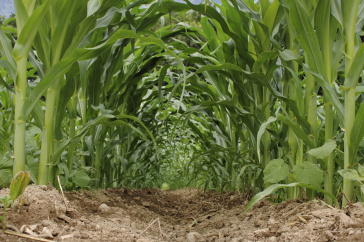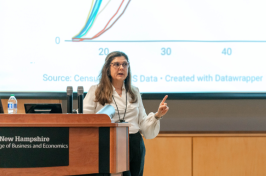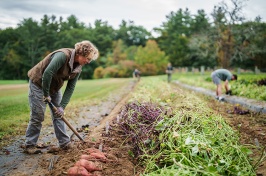The University of New Hampshire is a flagship research university that inspires innovation and transforms lives in our state, nation and world. More than 16,000 students from all 50 states and 71 countries engage with an award-winning faculty in top ranked programs in business, engineering, law, health and human services, liberal arts and the sciences across more than 200 programs of study. UNH’s research portfolio includes partnerships with NASA, NOAA, NSF and NIH, receiving more than $100 million in competitive external funding every year to further explore and define the frontiers of land, sea and space.
UNH Researcher Receives Grant to Study Effects of Pesticide Treatments on Weeds

An interrow of corn. A researcher with the NH Agricultural Experiment Station at the University of New Hampshire has received a grant to determine if pesticide seed treatments inadvertently protect weed seeds in the soil from being attacked by naturally occurring invertebrate and fungal species. Credit: Nick Warren/UNH
DURHAM, N.H. – A researcher with the NH Agricultural Experiment Station at the University of New Hampshire has received a federal grant to determine if pesticide seed treatments inadvertently protect weed seeds in the soil from being attacked by naturally occurring invertebrate and fungal species.
Many crops in the United States, including some in New Hampshire, are grown from seeds that have been coated with a mixture of fungicides and insecticides. These pesticide seed treatments are intended to protect the crop from soil pathogens and insect pests. Increasingly, however, scientists are finding that these seed treatments also are affecting other organisms that live in and around agricultural fields. Many of these soil microfauna are beneficial to agriculture.
“A host of insects and microbes that live in and on the soil perform beneficial services that that we often fail to appreciate, including suppressing weed populations,” said Richard Smith, associate professor of agroecology. “By attacking weed seeds in the soil, these beneficial organisms help to reduce the numbers of weeds in a crop field that then need to be controlled through other means, such as with tillage or herbicides.”
UNH researchers will investigate the role pesticide seed treatments play in mediating weed population and community dynamics, identify likely mechanisms contributing to the impacts of such treatments on weeds and their natural enemies, and explore whether cover crops, coupled with additional integrated pest management tactics, can mitigate nontarget effects of pesticide seed treatments on weeds.
“We have data suggesting that the insecticides and fungicides coated on most corn and some soybean seeds, generally referred to as pesticide seed treatments, can exacerbate the weed challenges faced by farmers. We hypothesize that pesticide seed treatments protect weed seeds in the soil from attack by their invertebrate and fungal “natural enemies,” and we have preliminary data supporting this,” Smith said.
“We also have data indicating that noncrop plants, such as cover crops, can take up significant quantities of residual pesticides from the soil, suggesting that strategic planting of cover crops could mitigate spill-over effects of pesticide seed treatments on weeds, including those resistant to glyphosate,” he said.
Glyphosate-resistant weeds are a serious concern in many regions of the United States, and this has prompted many farmers to seek alternative ways of managing these weeds, including by enhancing populations of organisms that naturally kill weed seeds. “If pesticide seed treatments are facilitating the persistence of weed seeds in the soil by protecting them from attack by beneficial organisms, whether that be on farms in the Corn Belt or here in New Hampshire, that’s a problem we really need to figure out how to address,” Smith said.
The research project will take place at the UNH Kingman Research Farm, a facility of the NH Agricultural Experiment Station, and a university research farm in Pennsylvania. The research project builds on Smith’s previous experiment station-funded research on cover crops. John Tooker, associate professor of entomology at Penn State, also is collaborating on the project.
The grant funding the three-year project led by Smith is one of 21 totaling $7.6 million for research to help manage pests and beneficial species that affect agricultural crops; UNH received $474,679. It was made by the U.S. Department of Agriculture's National Institute of Food and Agriculture (NIFA), with funding made possible through NIFA’s Agriculture and Food Research Initiative program, authorized by the 2014 Farm Bill.This material is based upon work supported by the NH Agricultural Experiment Station, through joint funding of the National Institute of Food and Agriculture, U.S. Department of Agriculture, and the state of New Hampshire. This work also is supported by NIFA’s Agriculture and Food Research Initiative through grant 1012600.
“There continues to be a critical need to develop new ways to defend our crops against pests,” NIFA Director Sonny Ramaswamy said. “NIFA investments will also help to develop better strategies to foster the beneficial insects and microbes that have potential to combat pests.”
Founded in 1887, the NH Agricultural Experiment Station at the UNH College of Life Sciences and Agriculture is UNH’s original research center and an elemental component of New Hampshire's land-grant university heritage and mission.
PHOTO AVAILABLE FOR DOWNLOAD
https://colsa.unh.edu/nhaes/sites/colsa.unh.edu.nhaes/files/media/images/corn_interrow.jpeg
An interrow of corn. A researcher with the NH Agricultural Experiment Station at the University of New Hampshire has received a grant to determine if pesticide seed treatments inadvertently protect weed seeds in the soil from being attacked by naturally occurring invertebrate and fungal species. Credit: Nick Warren/UNH
-
Media Contact
Lori Tyler Gula, PhD | NH Agricultural Experiment Station | lori.gula@unh.edu | 603-862-1452
Latest News
-
May 15, 2025
-
May 14, 2025
-
May 14, 2025
-
May 6, 2025
-
April 15, 2025













































